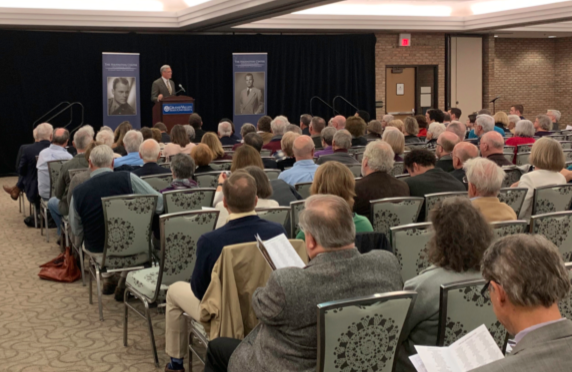GV acknowledges former general, presidential candidate for leadership

GVL / Andrew Nyhof
Mar 18, 2019
On March 14, members of the west Michigan community convened at Grand Valley State University’s Eberhard Center in downtown Grand Rapids to commemorate the service of Wesley K. Clark, retired Army general and candidate in the 2004 presidential election.
During Clark’s 38 years of service in the United States Army, he oversaw strategic airstrikes during NATO’s Operation Allied Force, ending the ethnic cleansing of Albanians in Yugoslavia, as well as negotiating the 1995 Dayton Peace Accords that ended the Bosnian War. Following his retirement from the United States Army in 2000, Clark said it was America’s response to the 9/11 terrorist attacks that prompted him to become involved in politics. He went on to run in the 2004 Democratic Primary, winning Oklahoma.
With prominent members of GVSU’s Board of Trustees present along with members of the community, the event aimed to celebrate the leadership and public service that not only is valuable to local communities in west Michigan, but also on a national level.
The event began as Director of the Hauenstein Center for Presidential Studies Gleaves Whitney spoke about the life of the center’s namesake, Ralph W. Hauenstein. He highlighted the public service of the former Army colonel, newspaper editor and philanthropist, stating that “leaders continue to lead long after they’re gone,” and emphasizing the importance of values and compassion in public leaders in the community.
Whitney and GVSU President Thomas Haas then welcomed Clark to the stage, presenting him with the Col. Ralph W. Hauenstein Fellowship Award, a prestigious award given to other public leaders such as former Secretary of State Madeleine Albright and President Gerald Ford.
Following the award ceremony, Clark gave a speech regarding the current political polarization within the country. He asked how the United States, as the wealthiest nation in the world, has an increasingly-large economic disparities between the wealthy and the poor, then asked “how did we fall into (a) deep political crevice where the left and right fight.”
Clark began his speech with a wide-ranging historical analysis of 20th century America. Beginning with World War I, Clark said that although Woodrow Wilson initially detested American involvement in the war, his presidency involved both the mobilization of American industry to end the war and women gaining the right to vote. It also established the United States as a world power and a bastion of democracy.
Clark then spoke about the Roaring Twenties’ great industrial and economic power. This period ended as the stock market crashed in 1929, ushering in the Great Depression. Clark highlighted events during this period that exacerbated the plight of Americans, such as the inaction of the Hoover administration, the Hawley-Smoot Tariff Act of 1930 and a rise in isolationist views that failed to render aid to European allies, allowing Hitler’s Nazi Germany to amass more power during the period.
“You must use the power of government to strengthen free enterprise,” said Clark, drawing from the first 100 days of Franklin Roosevelt’s administration that enacted progressive policies aimed at lessening the depression’s economic effects.
Clark said that the 1950s represented a time in which the United States was unrivaled by any other nation, as “each generation could expect to do better than their parents.” Citing President Eisenhower’s investments in infrastructure and education, Clark stated that “American culture was the icon of the world” during this period.
Clark’s speech then addressed the 1960s, a period of uncertainty and angst driven by America’s involvement in the Vietnam War. While President Johnson’s administration built upon domestic platforms championed by Roosevelt and Truman, the Vietnam War horrified Americans watching the war unfold on television.
“It’s said you can choose guns or butter,” Clark said. “During this period, we chose guns and butter.”
Following this sentiment, Clark then addressed the recent history of the nation.
“We won the Cold War,” Clark said. “People my age would have never believed it, but once we lost our adversary, we lost our strategy.”
He argued that stagnant wage growth during the 1980s coupled with the breakup of the USSR and the acceleration of off-shore manufacturing spurred by NAFTA during the 1990s led the United States to lose its focus for the future.
Clark also spoke about increasing competition with China, as China has invested in infrastructure in the form of high-speed rail and is in the process of constructing other projects across the globe aimed at increasing its influence.
Clark said that legislators need to develop a comprehensive foreign policy agenda to ensure America’s interests remain strong in the face of Chinese globalization.
“If you have global interests, you better get out there and lead globally,” Clark said.

























